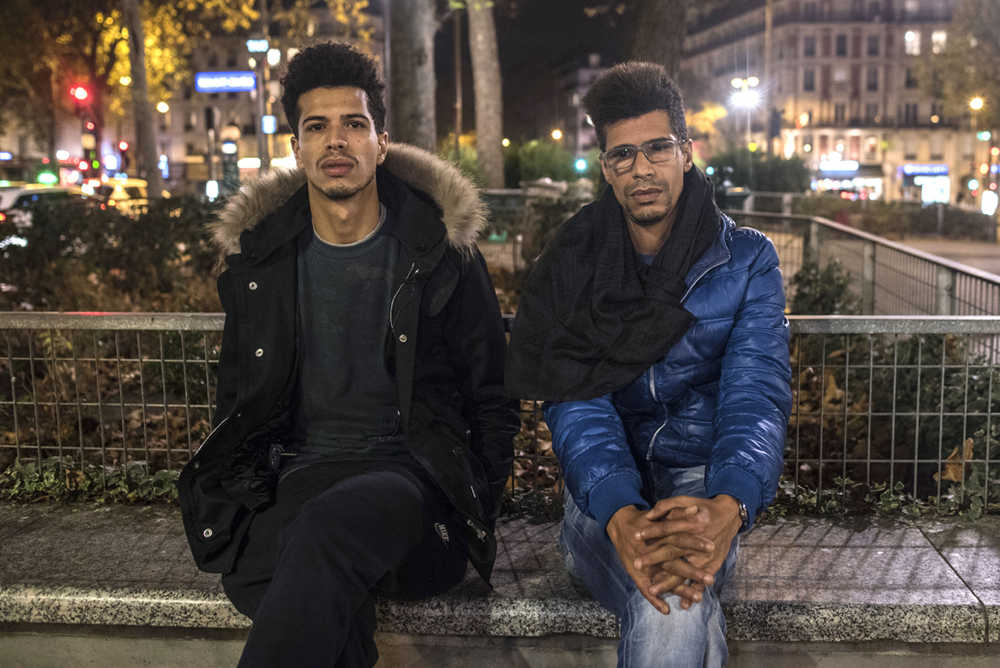PARIS — Halima Saadi Ndiaye was celebrating her 36th birthday in a cafe where her brother worked when terror took over. Within a minute, she was dead. Within hours, her sister Hodda was, too. Her brother Khaled tried in vain to save them along with friends and other cafe patrons.
The memory tortures him, along with worry about the future of his neighborhood, a place proud of its diversity and tolerance.
French-born siblings with Tunisian roots and family in Senegal, the Saadis embody that ideal. After Friday’s attacks by Islamic extremists, they now worry about a backlash against Muslims and other minorities, moderate or otherwise.
The cafe’s majority shareholder, Gregory Reibenberg, is Jewish, and a friend of Saadi’s family. Reibenberg lost his wife in the attack, and he and Saadi marched together over the weekend in memory of their lost loved ones.
“We are all inhabitants of this, people, and we need to fight for each other and help each other. There were black people, Arabs, Jews there. All of us were hit. So we are all in the same boat,” said another brother, Abdallah, who flew in from Tunisia to join his family as soon as he heard about the attacks.
The neighborhood is around the Canal Saint Martin, at the intersection of the 10th and 11th arrondissements. Narrow cobblestone streets intersect with grand tree-lined boulevards, with a cafe on every corner, many hosting live music, interspersed with kebab shops, eclectic groceries and hip boutiques. Young people crowd the neighborhood every night, drinking, smoking or playing music along the embankment.
The attack took place around 9:30 p.m. Friday, on an exceptionally balmy night for November. The sidewalk cafe of La Belle Equipe was full.
“There were three birthdays, including my sister’s,” Khaled Saadi recounted, tears surfacing. Then, “they came and started shooting everyone inside and outside.”
“I lay on the ground on my stomach hoping to avoid the bullets,” he continued. “When I heard that there was no more shooting, I raised my head, but they started shooting again, so I hid again.”
After a minute that felt like eternity, the guns fell silent. He stood and found two of his sisters, along with friends and colleagues, in pools of blood.
“My first move was to look for my two sisters. So I found the first one, Halima Saadi. She died on the spot,” he said. “And my second sister Hodda, I tried to save her.
“I moved her with a friend of hers named Sam. We moved her to another restaurant nearby, and then we did the same for my other sister,” he said. They talked to Hodda, who was barely breathing, and assured her they were there.
Emergency services arrived within about 20 minutes but told him there was little hope. He later learned she died upon arrival at the hospital that treated some of the 350 people wounded in Friday’s attacks.
Halima and Hodda were among at least 129 people killed.
The sisters were close, even though Halima had moved to Senegal with her husband and two children, 3 and 6. Hodda also owned a share in La Belle Equipe and was its manager, and the siblings often hung out there, sharing a glass or a meal.
“And they were beautiful,” Saadi said.
Reibenberg’s wife died in his arms. He lost many friends that night, too, and is trying to keep the community united in grief.
“I was holding her hand. We couldn’t revive her. We couldn’t do anything more,” he told France-2 television. “She asked me to take care of our daughter, and I promised I would.”
Portraits of his wife, Djamila, and Halima and Hodda Saadi hang on the window of the cafe, along with pictures of several other victims of France’s worst attack in decades. Candles, flowers and notes adorn the sidewalk.
Religious tensions have mounted in France in recent years. Islamic extremist attacks have repeatedly targeted Jews, and the far-right National Front has fomented suspicion of Muslims.
The Saadi brothers don’t want the attacks to scare people away from the neighborhood they love for its multicultural cohesion.
“The people who do this, they kill Muslims, they kill everyone,” Abdallah Saadi said. He knew all too well the horrors his brother suffered: He lives in the Tunisian resort city of Sousse, shattered by an Islamic extremist attack in June that killed 38.
“I hope that the French people won’t mix up everything,” he said. “We are born in France. … We are just citizens as anyone else, loving our families and the people in general, and we lost two sisters.”

